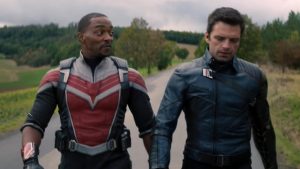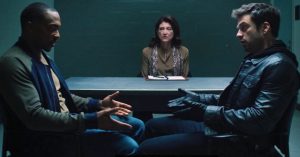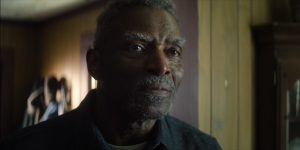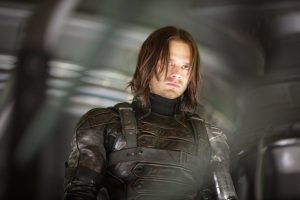SPOILERS FOR THE FALCON AND THE WINTER SOLDIER AHEAD!
The Falcon And The Winter Soldier got off to a bit of a slow start last week, drawing in a huge audience for Disney+ but generating fairly minimal buzz online – with the exception of some admittedly very thought-provoking niche discussions about whether Tony Stark should have paid the Avengers, and what Bucky’s reference to “tiger photos” said about his sexuality, if anything. Just MCU stan twitter at its finest.

Generally, though, there was some concern among fans that The Falcon And The Winter Soldier wouldn’t turn out to be a big conversation-starter like its predecessor, WandaVision, which consistently had even casual audiences going wild with theories – a crucial element of the series’ popularity that backfired in fans’ dumbstruck little faces towards the end. That concern has hopefully been assuaged today. Coming off a premiere I described as soft and fluffy fanfic (albeit a very good one), The Falcon And The Winter Soldier ratchets up the tension, the drama, and the stakes, for all our characters – even John-punchable-face-Walker (Wyatt Russell).
In some way, this is the closest thing to a Walker-centric episode…and hopefully the last time we’ll be asked to dive so deeply into the character’s psyche. During an extended opening sequence that had me terrified the whole episode was going to focus on his backstory, we learn that Walker is a golden boy in the U.S. military, the recipient of three Medals of Honor, and a really bad actor (to be clear, that’s Walker: not Russell, who’s doing a very good job), who’s apparently only trying to do the right thing by stepping into Captain America’s shoes. But as his marching band intro music plays over the Marvel title cards, it’s impossible to take him seriously.
Deep down, even Walker must realize or suspect that he’s a pawn: a tacky, suitably camera-friendly piece of sentient military propaganda designed by the U.S. Government to project a frighteningly familiar image of jingoistic nationalism to the rest of the world, while tales of his heroic exploits distract the media from the government’s more sinister operations elsewhere…in short, he’s the kind of manufactured, consumer-tested Build-A-Bigot that the modern GOP wishes they had, and have been trying to construct for years now (looking at you, Dan Crenshaw)…and he is everything Steve Rogers knew he couldn’t be in The First Avenger, when he too was trotted out as morale-boosting entertainment for the troops.
But while Walker leans into the commercialization of his character, posing with Cap’s shield and marketing action figures of himself, Sam Wilson (Anthony Mackie), the rightful heir to the legacy, has to get back to work fighting the mysterious Flag-Smashers: who serve a valid purpose in the story, but don’t feel very organically implemented, having just suddenly become the antagonists because Joaquin Torres (Danny Ramirez) has made them out to be. The Flag-Smashers don’t appear to be very well-organized villains, perhaps because they’re not all that villainous: their leader, Karli Morgenthau (Erin Kellyman), is implied to actually be helping people by smuggling medicine to refugee camps around Central and Eastern Europe.
In return, she and other Flag-Smashers are welcomed into the homes of civilians, calling back to a conversation Sam had last episode about the “tremendous amount of goodwill” that keeps superheroes functioning despite not being paid for their services to humanity. That being said, the Flag-Smashers are still heavily-armed and accompanied by an elite bodyguard of enhanced Super Soldiers, including Morgenthau herself. To deal with the heightened threat, Sam calls in Bucky Barnes (Sebastian Stan), who’s conveniently answering texts now. A result of his therapy working, or a plot device? We shall never know.

We all knew, however, that I wasn’t going to be able to make it through this review without geeking out over the heroes’ reunion – where the conversation quickly turns to “The Big Three”, Sam’s term for aliens, androids, and wizards; the Avengers’ most common enemies. In the back-and-forth, Bucky mockingly namedrops Gandalf, before smugly revealing that he read The Hobbit when it first came out, in 1937 – a miraculous feat given that the first American edition of the book wasn’t published until 1938, which means Bucky didn’t just pick this up on a whim: he literally would have had to order it all the way from England, because he’s just that much of a Tolkien nerd. By a lucky coincidence, yesterday was also Tolkien Reading Day!
The random yet endearing exchange continues the fluffy fanfic vibes I picked up from the premiere episode…and speaking of fanfic, are we gonna talk about the new SamBucky content, or what? Yes, yes, we are. And not just the banter, but the inherent sexual tension of them being forced to roll on top of each other during an action scene, or engage in a “soul-gazing exercise” at the orders of Bucky’s therapist (played by Amy Aquino, who is phenomenal). For me, it’s the way all the heteronormative “bromance” jokes and sight gags accidentally just make the situation more gay.
The episode packs a lot into its back half, including a pretty long action sequence with the Flag-Smashers in rural Germany, which moves from an abandoned warehouse to a highway fight on the tops of two moving MAC trucks like a violent Euro Trucks Simulator mod (complete with random, seemingly driverless car that gets wrecked in the ensuing chaos while trying to pass). Things quickly go wrong: Falcon’s wings are somewhat limited on the narrow stretch of road, and Karli Morgenthau smashes his drone Redwing over her knee, while Bucky’s vibranium arm can’t save him from being dragged under a truck. And that’s when John Walker intervenes to “save” the duo, popping up in the first of many surprise appearances.
This is followed by what feels like an even longer sequence of Sam and Bucky being forced to ride back to the airport with Walker’s team after their humiliating defeat; a cringeworthy opportunity to see how fame has gotten to Walker’s head in a very short time. In the face of mediocrity, Sam keeps his cool, while Bucky loses his temper quickly and insults Walker, before jumping out of the vehicle when Walker’s companion, Lemar Hoskins (Cle Bennett), reveals his ridiculous code name, Battlestar. Sam, as a Black man, is forced by circumstances to remain civil – because the one time he gets angry and raises his voice, later in the episode, he’s immediately surrounded by cops who threaten him.
On that sad note, it’s time to talk about Isaiah Bradley (Carl Lumbly), who makes his long-awaited MCU debut surprisingly early. Revealed as a former enemy of Bucky’s from the Korean War era, Bradley it turns out is still alive after six decades lying low in Baltimore: having been experimented on using the longevity-inducing Super Soldier Serum, or some variant of it. In the comics, Bradley’s origin story dates back to World War II, when white doctors used and abused his body to test out their own versions of the Serum, giving him enhanced abilities and a lifetime of trauma. I’ve always believed this reveal would be most significant if Bradley predated Steve Rogers’ miraculous transformation, but there’s no indication that’s the case yet.
Bradley’s introduction sheds light on the MCU’s dark past, while the introduction of his teenaged grandson Eli (Elijah Richardson) illuminates its hopeful future. Eli might seem like a background character in The Falcon And The Winter Soldier, but comics readers will recognize him as a member of the Young Avengers. He may even be the first Young Avenger to enter the MCU in his final form, given the recast of Cassie Lang and the fact that Wiccan and Speed will presumably also be recast when they age up to teenagers. In the comics, his powers come from a blood transfusion from his enhanced grandfather.

The history of the Serum is quickly emerging as the through-line of the series’ plot: running parallel to, and beautifully intersecting with, the emotional through-line of Sam and Bucky (and even John Walker) learning what went into the making of Captain America, and what it takes to live up to his legacy. But with only vague hints from Bradley as to his origins, and with Walker revealing – and confirming through his action scenes – that he doesn’t have a drop of Serum in his veins, the Falcon and the Winter Soldier are forced to turn to someone else for help…someone who knows the Serum’s history intimately, and was presumed to have killed all the Super-Soldiers manufactured by HYDRA in Bucky’s image: Helmut Zemo (Daniel Brühl), who is exactly the type of thwarted sociopath that creepily plays chess with himself while brooding in prison.
Episode Rating: 9/10
